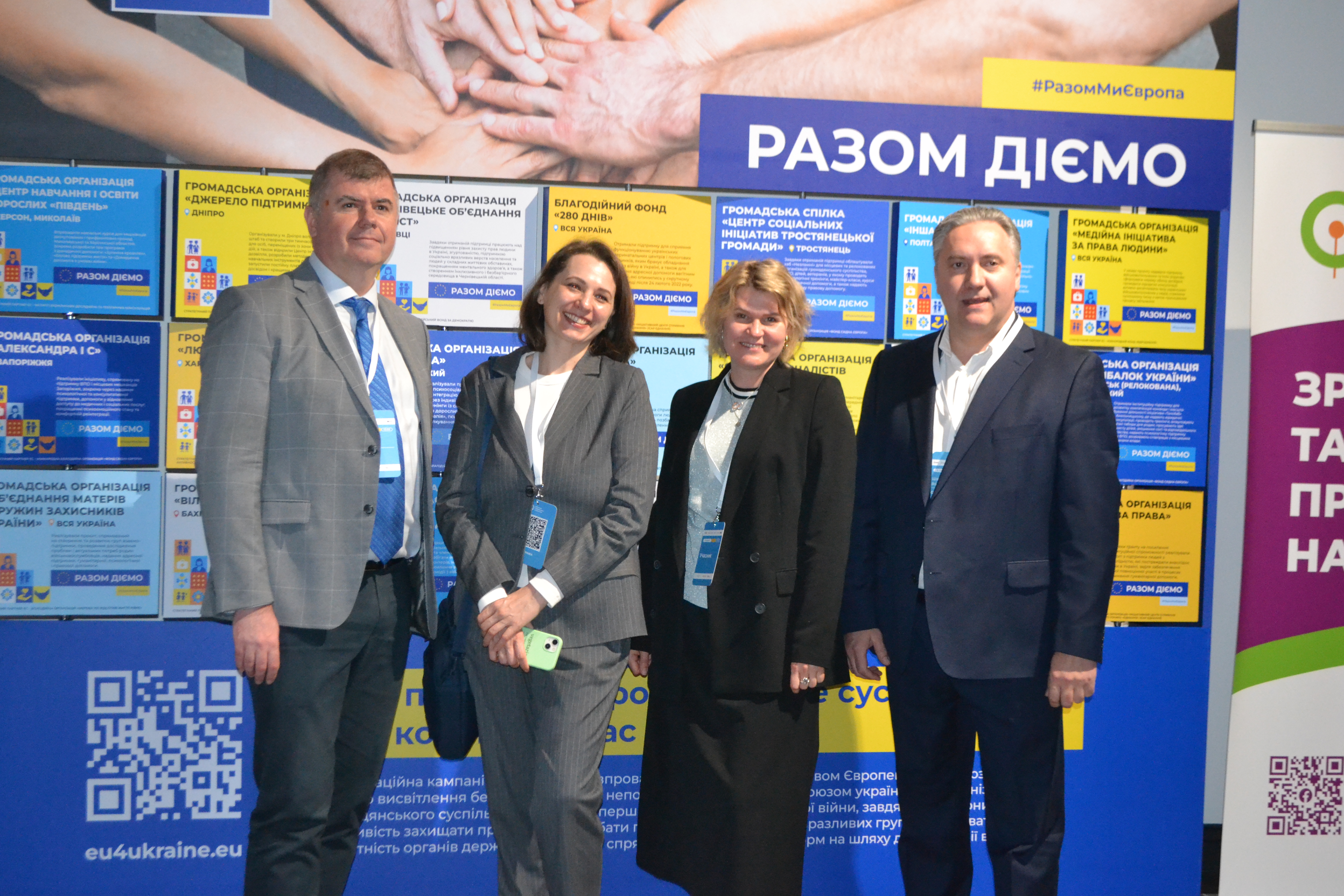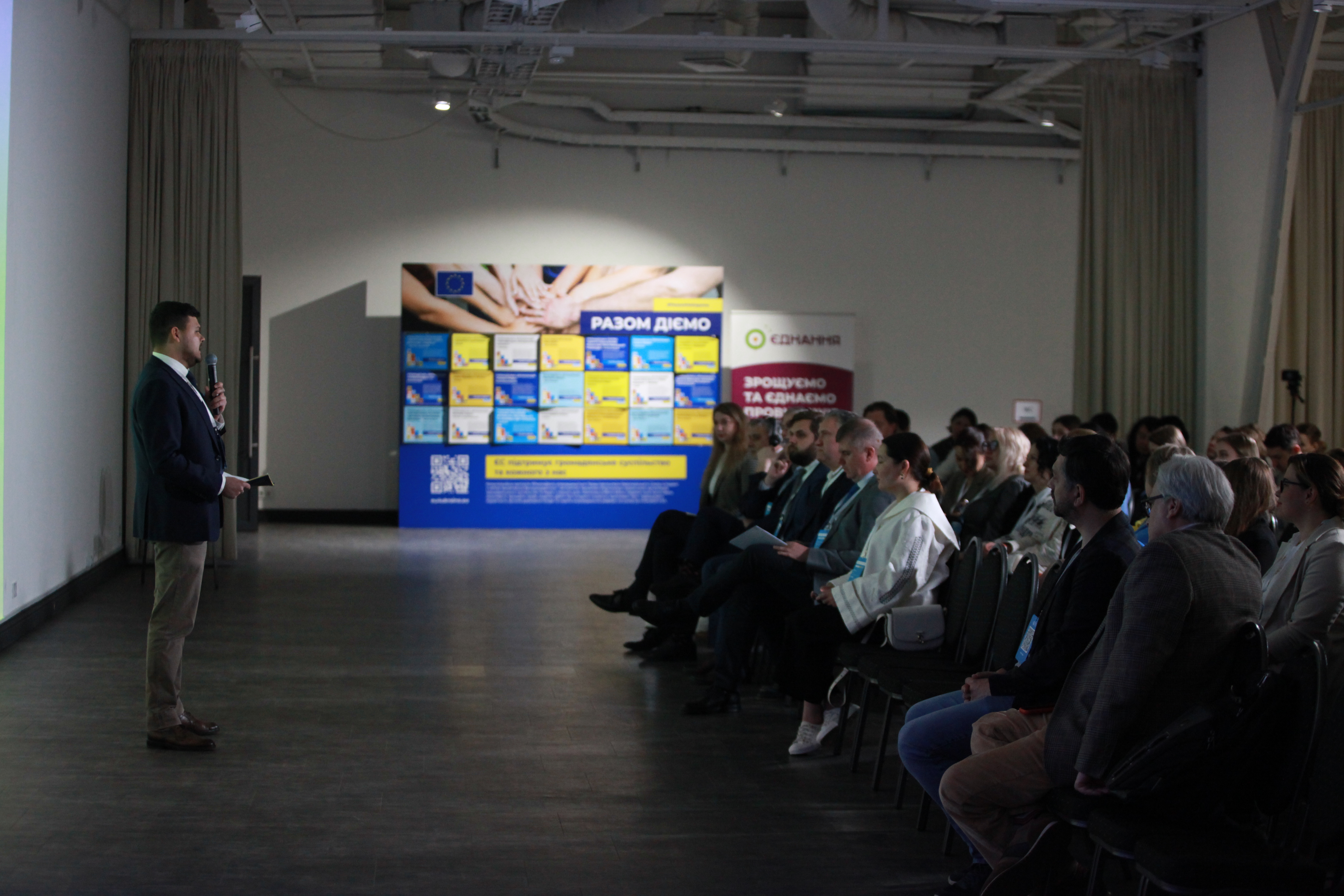Ukraine is standing on the threshold of accession negotiations with the European Union. At this stage, the government will require assistance from the civil society sector. On May 9, Europe Day, the EuroSummit of civil society organisations took place in Kyiv. More than 200 representatives of civil society organisations (CSOs), experts, activists, and representatives of the authorities, including the government and the Verkhovna Rada of Ukraine, as well as Ukraine’s partners from the European Union, joined together to develop a common vector of work in the process of Ukraine’s accession to the EU.
On June 23, 2022, the European Council granted EU candidate status to Ukraine. On December 14, 2023, the Council made another historic decision to open accession negotiations with Ukraine. Civil society organisations and analytical centres have greatly contributed to the process of implementing the Association Agreement. The next stage is the full implementation of the Association Agreement and the realisation of all the possibilities of EU candidate status. This will mean closer cooperation in politics and security and gradual economic integration into the EU’s single market. The expertise that is available to Ukrainian civil society is needed to strengthen the negotiation process.
“Despite Russia’s ongoing full-scale war against Ukraine, the country is working to rebuild and implement reforms in preparation for EU membership. Ukrainian society demonstrates resilience, vitality, and a strong will for democracy, human rights, and European values. The European Union has supported and will continue to support Ukrainians on this path. Cooperation with civil society remains a key priority for the EU in this regard. The EU in Ukraine works with civil society across all sectors and throughout the country,” said Stefan Schleuning, Head of Cooperation at the EU Delegation to Ukraine.
The first round of negotiations (Intergovernmental conference) could take place this summer. Ukraine’s negotiating framework will be presented at the same time. It is important that it states the government’s readiness to involve civil society organisations in the negotiation process. The key aspects of involvement include: informing the public about the progress of negotiations; the government needs to develop a mechanism for public involvement; in turn, the public should have the opportunity to actively monitor the EU accession negotiation process, its dynamics, and the correctness of reform implementation.
Organisations that have been helping the government and the ministries implement the Association Agreement have strong expertise. They can be involved in the process and their awareness of EU law can be improved in the context of the negotiation process.
“Since February 24, civil society organisations have once again proven that they are a reliable support for the country and its defenders. Civil society in Ukraine is influential, dynamic, and adaptive. ISAR Ednannya is working to strengthen the civil sector and improve the environment in which civil society organisations operate. The development of civil society is a significant indicator of a country's values and freedoms. Among the leaders today are the experts who understand their field from the inside out and can significantly strengthen the positions of the Ukrainian government during the accession negotiations,” emphasised Volodymyr Sheyhus, Executive Director at ISAR Ednannya.
EuroSummit of CSOs brought together representatives of civil society across various fields of activity (climate and green transition, agricultural sector, human capital, entrepreneurship, public administration reform).
The role of sectoral organisations operating in narrow spheres, such as environment, climate, phytosanitary norms, is very important. They possess deep knowledge and are effective in their field within the context of lobbying for the right ideas. However, they need to synchronise with the European integration agenda. These CSOs, while lobbying European integration, can also achieve their goals as organisations that unite citizens.
“Experts at CSO EasyBusiness have analysed over 20 cases of post-war recovery. A third of them were provided thanks to cooperation between the private, public and civil sectors. European integration and Ukraine’s economic recovery are interconnected processes. Joining the EU will create new opportunities for business development and GDP growth. Event now, at a time when the EU is reorienting towards friendlier exports, we have new opportunities for nearshoring and attracting new investments. Next, we need to be included in European value chains at higher levels than just supplying raw materials. We need to develop production of high added value goods,” says Dmytro Lyvch, Head of CSO EasyBusiness.
Following the presentation of research results by the CSO EasyBusiness analysts and panel discussions with participation from representatives of the Ukrainian Cabinet of Ministers, Parliament, the EU Delegation to Ukraine, and experts, thematic workshops and experience exchange sessions were held. Networking also took place to develop proposals regarding scenarios for involving civil society organisations in the negotiations on Ukraine’s accession to the EU.
All proposals from the summit will be submitted to the government along with lists of participating organisations that are ready to provide support during the negotiation process. Additionally, the summit organisers will work with international development partners to properly channel assistance to civil society organisations and analytical centres in order to strengthen their capacity to support the government in the negotiation process.
The EuroSummit of CSOs is organized by EasyBusiness NGO with the support of ISAR Ednannia within the framework of the project Ukraine Civil Society Sectoral Support Activity, which is implemented by ISAR Ednannia in partnership with the Ukrainian Center of Independent Political Research (UCIPR) and Centre for Democracy and Rule of Law (CEDEM), which is made possible by the generous support of the American people through the United States Agency for International Development (USAID), and also in partnership with the Delegation of the European Union to Ukraine.


